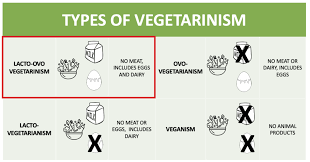

By Keerat Preet Kaur
First publised on 2023-03-21 14:12:12
Vegetarianism has become increasingly popular in recent years, with many people choosing to adopt this lifestyle for a variety of reasons, ranging from animal rights to environmental concerns to health benefits. With such a diverse range of goals, it's no surprise that the world of vegetarianism offers a wide array of options to cater to different dietary needs and preferences. Let's take a closer look at some of the most common types of vegetarian diets.
Lacto-Ovo-Vegetarian: This type of vegetarian diet includes eggs and dairy products, but excludes seafood and other poultry. Studies suggest that a lacto-ovo-vegetarian diet can reduce the risk of certain diseases, including cancer and heart disease. Within this category, there are also lacto-vegetarians who consume only plant-based and dairy products, and ovo-vegetarians who consume eggs but avoid dairy and other animal-based products.
Pescatarian Vegetarian: This diet is similar to lacto-ovo-vegetarianism, but includes fish and seafood for their nutritional benefits. Pescatarianism may exclude dairy products, eggs, and meat and poultry products.
Flexitarian Vegetarian: This is a more flexible form of vegetarianism that allows for occasional meat consumption while prioritizing the consumption of plant-based foods. This diet can be a good choice for people who want to enjoy the benefits of a vegetarian lifestyle but don't want to give up meat entirely.
Vegan: The strictest forms of vegetarianism, vegans avoid all animal-based products, including dairy and eggs. A well-planned vegan diet can provide all the necessary nutrients for good health, but it may require more careful attention to ensure a balanced and varied diet.
It's important to remember that everyone's dietary needs and goals are different, and there is no one-size-fits-all approach to vegetarianism. It's recommended to consult a dietitian or nutritionist before making any significant changes to your diet. Whether you're interested in cutting down on meat consumption or making a complete switch to a vegan lifestyle, there are many resources available to help you make informed choices and achieve your dietary goals.
Picture courtesy: Colorado State University (research.colostate.edu)











